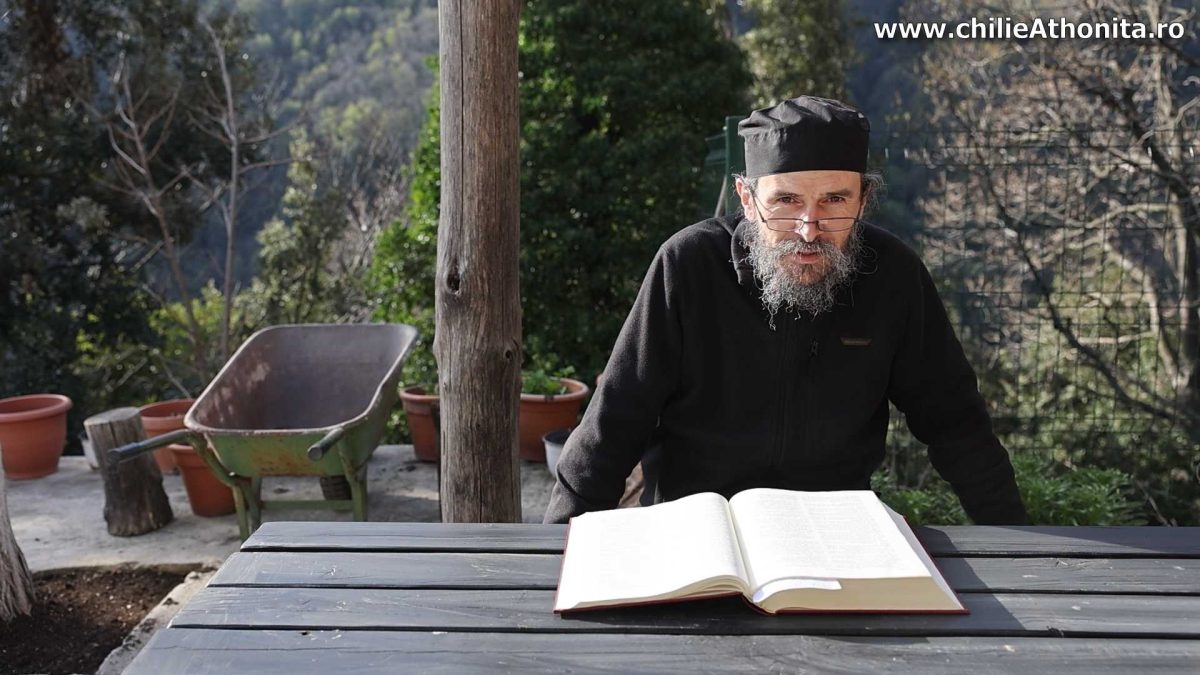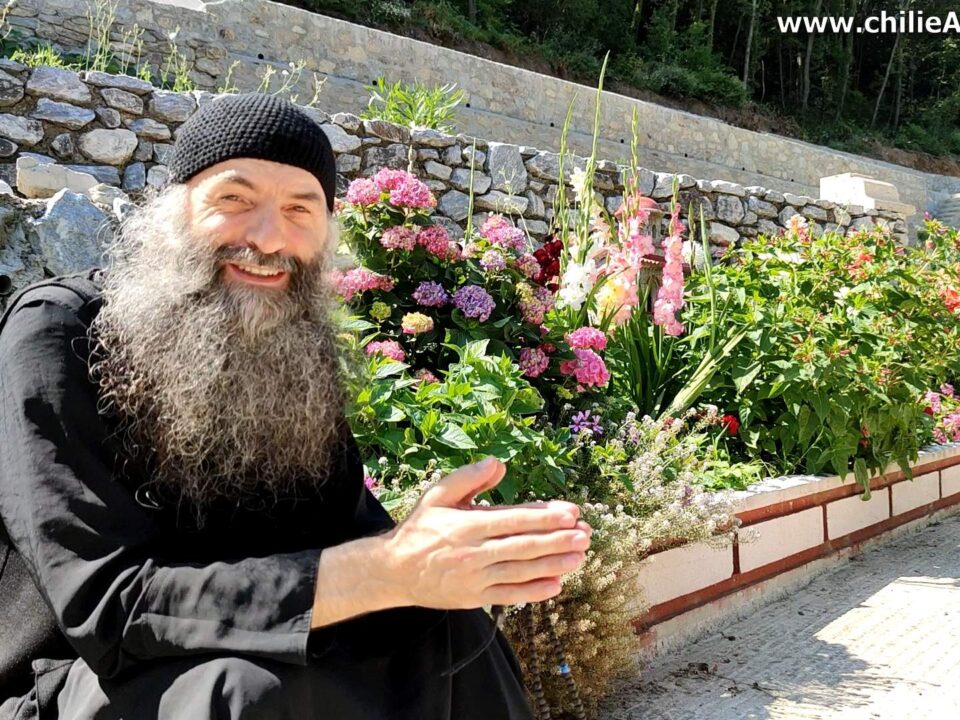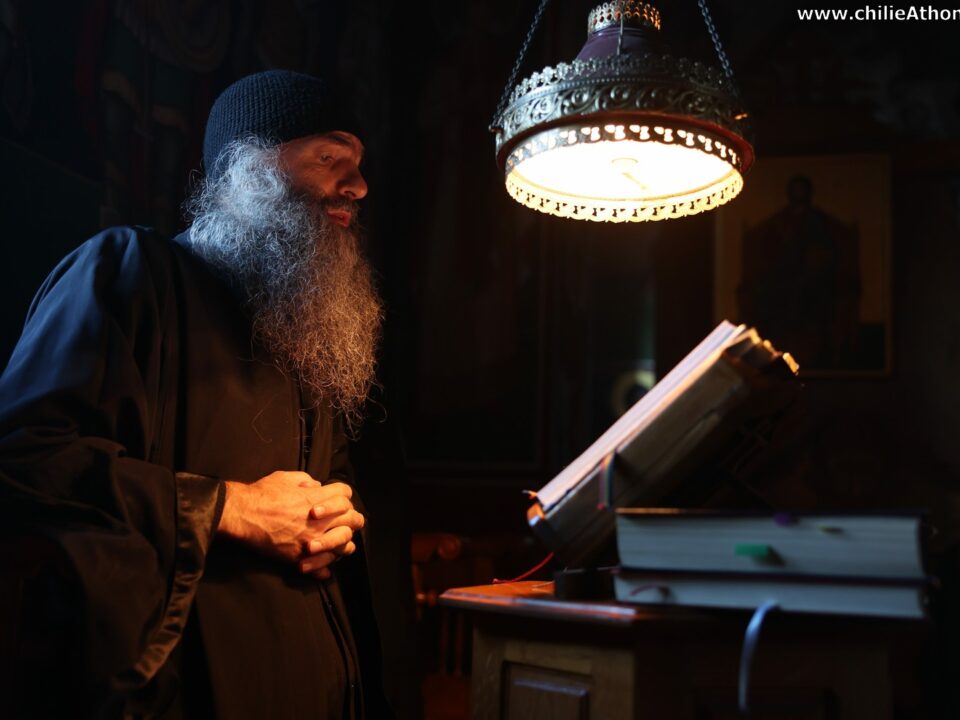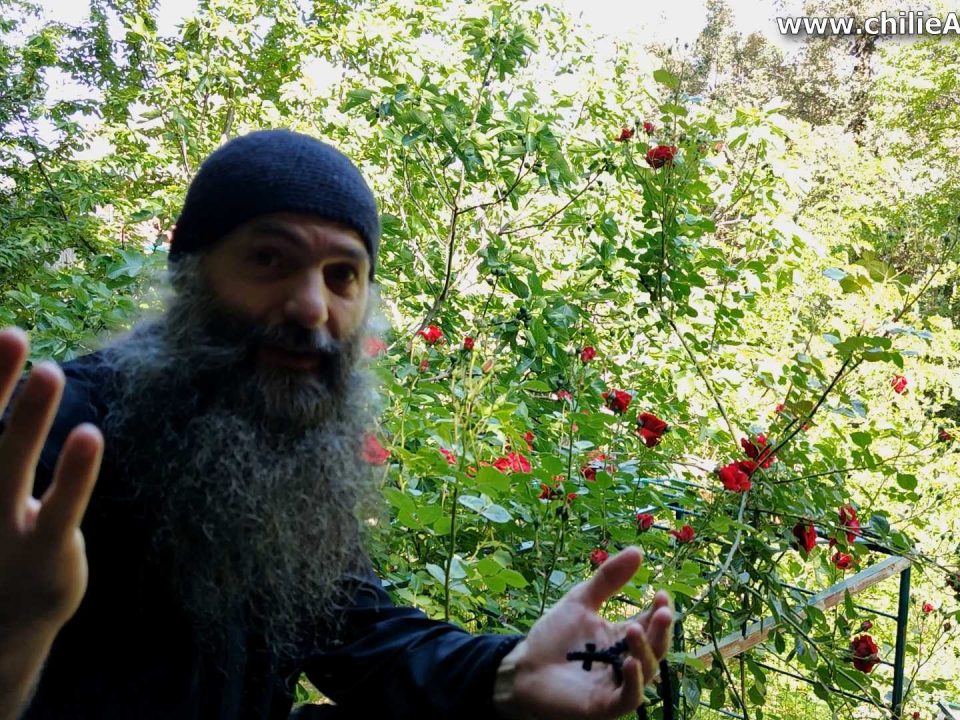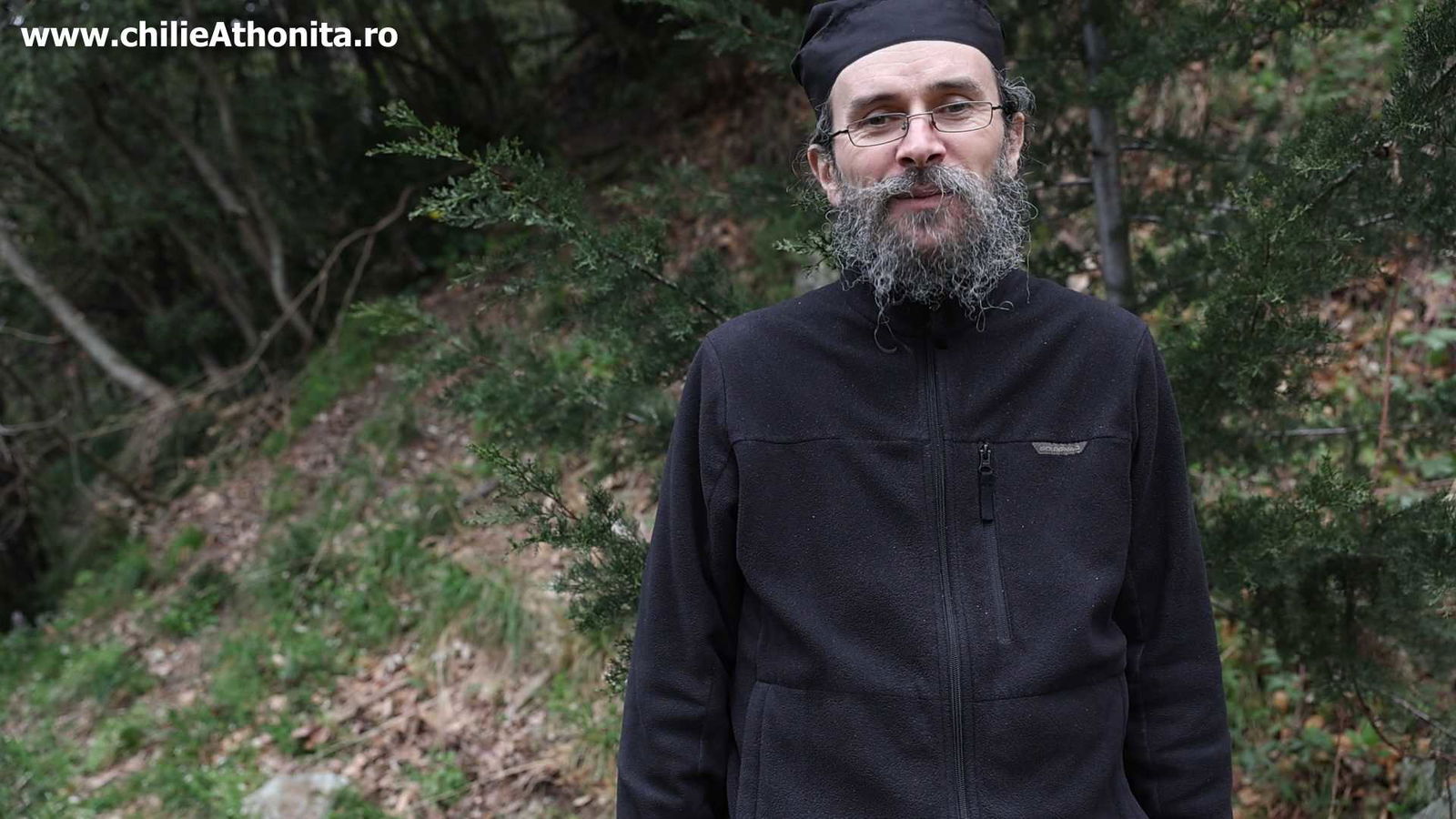
The Invincible Generalissima – Father Theologos
9 April 2022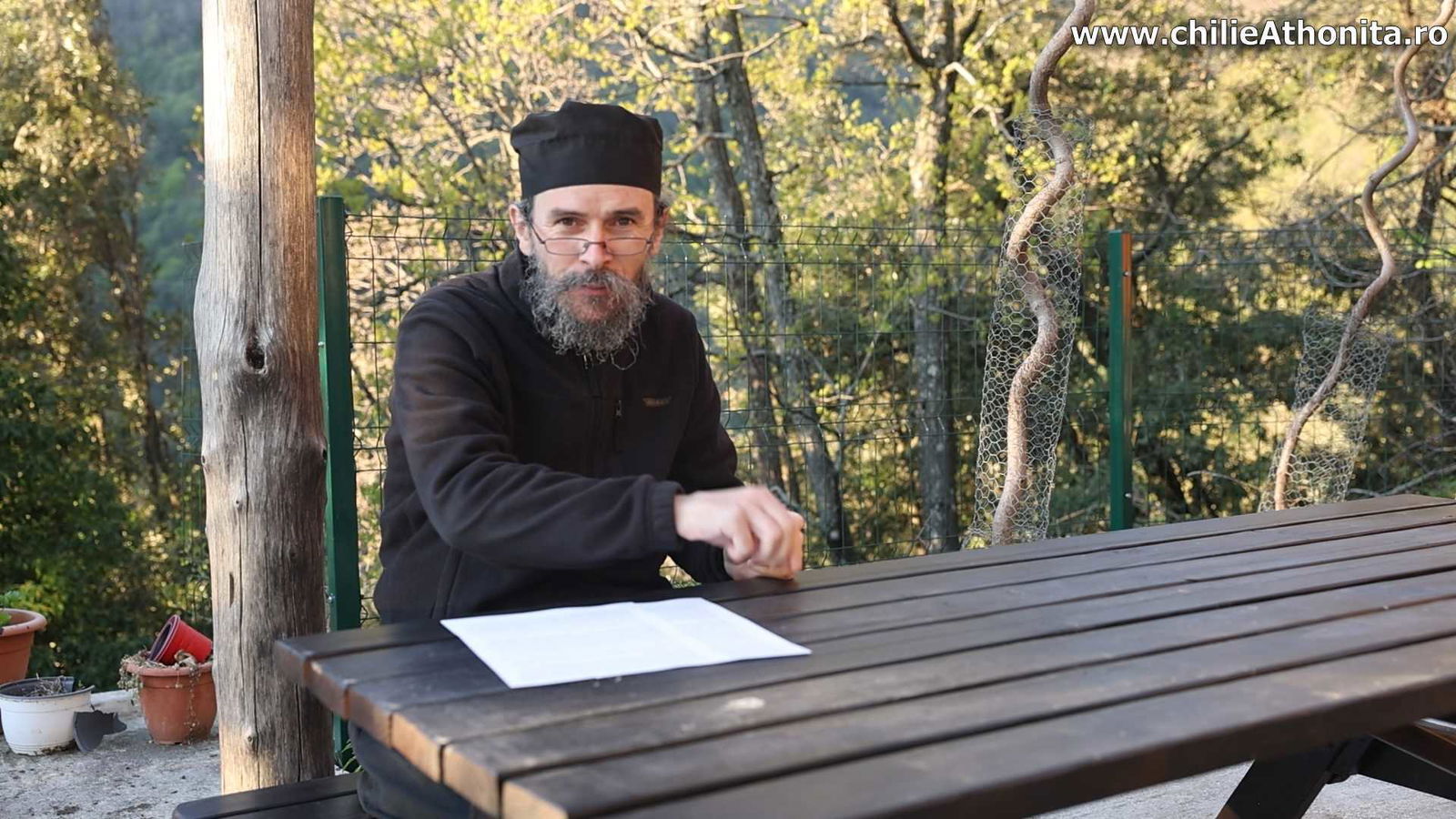
Are We Like Judas? – Father Theologos
19 April 2022The resurrection of the dead at the end of the ages. Indeed, since ancient times, since the time of the Old Testament, God speaks to us about this, but for us it is a somewhat abstract reality. A demonstration would be welcome, wouldn’t it?
Watch this video in which we show that a demonstration of the resurrection of the dead has indeed already taken place, with its consequences.
Enjoy!
He smiled very sadly when he saw that a man was stealing a pitcher, a clay pot. And in that moment, Lazarus said, An Athonite Cell Joys from the Holy Mountain Glory to the Father, and to the Son, and to the Holy Spirit now and forever and to the ages of ages. Amen. Through the prayers of our holy fathers, Lord Jesus Christ, Son of God, have mercy on us! Amen! Now we are going to talk a little about the Entrance of our Lord into Jerusalem and everything related to this Entrance of our Lord into Jerusalem, that is, the Resurrection of Lazarus. Maybe we will touch a little on the subject of the anointing of our Savior by Mary, Martha’s sister, but, first of all, I would like to say that beyond the historical fact, beyond the historical connotations that have happened, there are also spiritual connotations to this historical fact, and these are far more important than the facts that happened. First of all, let’s see the facts based on the Scripture that I have in front of me, and then we will see an interpretation of the holy fathers from a spiritual point of view.
And why are the entrance of the Lord into Jerusalem and the facts around it so important? I’m going to read from the Scripture, I’m not going to keep you very long because the text is very long and, unfortunately, it will seem boring to you. It is not boring, but I’m going to try to put up with the fact that, today, our minds are very ill with sin, and so, we don’t have such a capacity for concentration in order to listen to the word of the Gospel as we should. Very briefly: “Now a certain man was sick, Lazarus from Bethany, of the village of Mary and of her sister, Martha. And it was Mary that anointed the Lord with ointment, and wiped his feet with the hair of her head, whose brother Lazarus was sick.” Here you should know that this event took place after the resurrection of Lazarus as thanksgiving from Mary for the fact that the Savior resurrected her brother. Saint John the Theologian anticipates this event and notes here who Mary is. Why? Because Mary was well-known in the community of the early Church for this gesture of extreme humility, of extreme gratitude to our Lord Jesus Christ. Mary and Martha, you should know, because we are still talking about them, are the representation of practical life — Martha, and Mary — the representation of the contemplative life, that is, the spiritual life that one comes to live in the moment they approach God.
And, because of this, the moment someone approaches God, Mary — meaning contemplation, they truly realize who our Lord Jesus Christ is, the Savior who resurrects Lazarus, meaning that He resurrects the darkened mind, the mind mortified by sin, and, because of that, she anoints Our Lord Jesus Christ with the myrrh of love. This is a very high spiritual state, brethren, that would be great for us to reach, because it is a very joyful one, but it is a state that is a bit difficult to reach because we are more interested in the news, we are more interested in everyday life. But if we break away from the world, then, indeed, with the hair of our head, with our thoughts, we will anoint Lord Jesus Christ with myrrh. So, Lazarus, meaning the mind, embodiment of the mind, is dead. And the Holy Scripture says: “And Jesus loved Martha, and her sister, and Lazarus.” As can be seen the person whom Jesus loved first of all was Martha, the factual, practical life. So, first of all, in order for our Lord Jesus Christ to love us, we must have good deeds, deeds that are pleasing to the Lord, and only after that Jesus will love the contemplative part of us because if we do not have deeds, our contemplative part will be totally distorted. Today, unfortunately, very many people have fallen into a contemplation, actually in a state of dreaming that is pseudo-contemplation. Due to the fact that we do not have good deeds, this contemplation is totally false and without foundation in God. “And so, when He heard that he was sick, He remained two days in the place where he was.”
Jesus intentionally stayed there so as to give Lazarus time to die. So you need to know that the human mind dies the moment God is far away. God sometimes does this purposefully to show His loving power. We often want a relationship with God that is based on self-love. That is, we do not want to suffer, we do not want to go through hardships, but this cannot be, because we are full of sin, full of pleasures, and pleasure, as I said many times before, only comes out through an analogous pain. So that the balance can be restored, and, because of this, many times God withdraws, because we are unable to maintain the grace, because, if we have grace, we feel great power and fall back into self-love. To continue… So, after two days, the Savior said to the disciples, “Let us go again into Judea.” Meaning that the Savior already knew that Lazarus, meaning the mind, had died and He wanted to resurrect it. “His disciples said to Him, «Lord, the Jews just sought to stone you, and you are going there again?»” Meaning the Jews who are representing the chosen people, had fallen into legalism. Pay great attention here: so the Jews are the representatives, if you will, of the Church that is today, the representatives of today’s pious people. The Romans are the representatives of pagans. The moment when the representative of the Church, the one who believes himself to be righteous, the one who believes himself to be all right, imperceptibly departs from God because of the confidence he has in his knowledge, that is, because of his self-confidence, at that moment, of course, he will throw stones at God. Because God is above human knowledge.
“And He said these things, and after that, He said unto them, «Lazarus, our friend, is asleep; I am going as to wake him up».” Of course the Savior referred to the death of Lazarus, but as we see, in Christ, death disappears and becomes sleep. Up until Christ, men were terrified of death. From Christ onward, death is terrified of men — as Saint Justin Popovici says. And death, as I said, turns into sleep, which is a period of transition to a better life, if, of course, one is in God. And, of course, here, the analogy with the mind is very clear again, because the Savior says “I’m going to wake him up” which means to awaken the human mind. Afterwards, the disciples do not realize what kind of sleep the Savior is talking about, and then the Savior openly tells them that Lazarus died. “I am glad for your sake, so that you may believe I wasn’t there.” But let’s go to him.” Well, why is He glad? For the disciples who were the closest to the Lord, still had a very limited faith. They believed that the Savior could perform miracles only in the moment he is present, only in the moment he places his hand, and so on. No. God is indeed Almighty and is not limited by either time or space.
Although the Apostle Peter, mainly, had professed Him as God, in spite of it, you see, the disciples did not believe and did not know what Son of God meant. And because of it, it says right after: “Then said Thomas, which is called Didymus, unto the rest of the disciples, «Let us also go and die with Him».” Well, brethren, if they had the consciousness that He was God, then they would no longer care if they died or lived because, in Christ, death is overcome. He goes to Bethany where Lazarus was being greeted and… “Therefore, when Martha heard that Jesus had come, she went out to meet him, and Mary sat in the house.” Who always greets Christ? The good deeds greet Christ, because Martha is the icon of good deeds. She greets Christ. So, brethren, do not think that, by contemplative life, by pseudo-contemplation, by reasoning, by thinking of Christ without having good deeds, or even by praying without having good deeds, will we find Christ! We will not find Him! Because Mary, as the Holy Scripture says, was siting in the house. So we need good deeds, we need sacrifice.
And Martha said unto Jesus: “Lord, if you had been here, my brother would have not died. But now I know that as many as you ask of God, God will give you.” So, you see that Martha did not have the consciousness that Our Lord Jesus Christ is in fact God and could do any kind of miracles and that He was the True Master of life and death. She believed that God must be present there. Of course, this is also faith, but not a perfect faith. “Jesus said to her: «Your brother will rise again». And Martha said to Him, «I know that he will rise again, at the resurrection in the last day». And Jesus said unto her, «I am the resurrection and the life; he who believes in me, though he may die, shall live. And whoever lives and believes in me will never die. Do you believe this? She said, «Yes, Lord. I have believed that you are the Christ, the son of God, who came into the world».” Well, and then the Savior says, Alright, good, let’s go to the grave to resurrect him. But Martha did not actually believe, like it says here, that He is the Christ, the Son of the Living God, because the moment the Savior said “Lift up the stone”, at that moment Martha says — “Lord, but it stinks”. And then the Savior says: “But have I not told you to believe the resurrection and the life?” So, as we see, our faith is very limited, and, in fact, through these miracles at the end of His work on this earth, at the end of His life, the Savior actually presses the gas pedal and pushes us into a faith far superior to the belief of the multiplication of bread, the healing of the blind and so on — which, today, unfortunately, is quite difficult for us to believe. So, the Savior makes it very clear to the two sisters that He is the Master of life and death.
And, beyond that, you should know that the moment the two sisters appeared there, in that moment, the Savior cried. You should know that this is the shortest and the greatest verse in all of the Holy Scripture. “And Jesus cried.” Jesus wept, and in the English-language Bible, which was the first Bible to be divided in verses, the monk who made this division into verses, was so impressed by this verse that he left it alone. It’s just two words: Jesus wept. Jesus cried. Why? Because Jesus wept not for Lazarus, let it be very clear to us! Because He knew He was going to resurrect Lazarus, but He cried for the other Jews, for all mankind who could not believe in Jesus’ omnipotence, and were, in fact, as the Holy Scripture says, like sheep that have no shepherd, like some wandering sheep. Because we are, brethren, in the moment we do not have God with us, we are actually on our own, we are like leaves blown upon by the wind, we have no meaning, we do not make sense. This is the biggest problem: the man has no meaning, no horizon, no destination the moment when there is no God!
The Jews, of course, full of self-love, as we all are, say: “Look how much He loved him.” [loved] Lazarus. So they did not think that the Savior was mourning for them. They thought they were fine, as we believe today that we are very well, so, they thought He was mourning Lazarus. “And some of them said, «Could not this man, who had opened the eyes of the blind, have done so that he did not die?»” So as we can see it is such a limitation, a cry-worthy one indeed, of faith. We are limited, brethren, you must know that we are limited by our minds. We are prisoners of our beliefs, of beliefs from below, of beliefs that cannot have the necessary scope to let God work. God is limited, as I said, by our faith. “Jesus said, «Lift the stone». Martha, the sister of the deceased, said to Him, «Lord, there’s already a bad smell, for he has been there for four days.»” As I was saying, she didn’t actually or, rather, she didn’t know what she was saying, and, because of that, Jesus told her: “Didn’t I tell you that, if you believed, you would see the glory of God?” That is, you’ll see Me in action simply put. “And they lifted up the stone, and Jesus lifted up His eyes, and said, «Father, thank you for listening to me».”
So, Jesus speaks in the past tense before He performs the miracle, because He had true faith, because He was perfectly united with the Father and wasn’t limited, as I said, by His faith. He was not limited by His mind, and beyond that, the Savior was beyond the space-time continuum. That is, for God, for Christ, there is no time — past, present, and future — these are just human notions. “I knew that you listen to me at all times but I said this for the people that stand around, so that they may believe that you have sent me.” So the Savior performs this miracle for us, for our helplessness. He doesn’t make a fuss about it. Do you understand? It is very important. As I was saying, the Savior tries to raise us to a new existential level, to show us what can be done. So, the proof that the Savior is sent by the Father is the Father’s perfect obedience to the Son — “to believe that You sent me”, and of the Son to the Father.
So the proof that we are God’s people is our obedience to God, and only then God will listen to us too. The more perfectly we obey God, the more thoroughly God will listen to us. And, of course, in this case, in fact, there is no question of obedience. It is a total synergy, total cooperation between God the Father and God the Son. And, because of this, says the Savior, “Lazarus, come out!” He doesn’t say — Lord, please send Lazarus out, send Lazarus out. No. He says, He commands as the Lord of life and death, saying “Lazare, devro exo!” “Lazarus, come out!” As the Master of life and death. “And he, who was dead, came out, and he was bound with strips of cloth upon his feet and hands, and his face was wrapped with a cloth.” Let’s stop for a moment, to understand: how did he come outside if he was bound upon his hands and feet and had his face covered with the cloth? The Savior actually teleported Lazarus. We should understand this. He actually moved him out. So we have a whole series of wonders here.
First, there is the resurrection of Lazarus, after which there is the teleportation of Lazarus and, above all, the reconstruction of Lazarus. Because Lazarus, as Martha says earlier, “Lord, there’s already a bad smell, he’s been there for four days.” Lazarus was already beginning to decompose. So the Savior had not only put the soul back into the body of Lazarus, but actually recomposed it. So, the Savior made a demo, a trailer, made a demonstration of what would happen at the resurrection from death, to show the people — brethren, this is what awaits you. This is what awaits us. And I can do this thing. And I’m going to crucify Myself. I crucify Myself, others do not crucify Me. Do you understand? This is very important. And after that, Jesus says to them: “«Untie him and let him go». So, many of the Jews who had come to Mary, and had seen what Jesus had done, believed in Him.” Of course, this faith is also a very limited faith because they all denied Jesus in less than a week, we should understand, alright? “
And some of them went to the Pharisees, and told them what things Jesus had done. Then the chief priests and the Pharisees gathered the council together, saying, “What can we do, as this Man performs many miracles?” So think, brethren, this Man recomposed a man! He went beyond death. And yet, the bishops and the Pharisees were afraid for their chair, for their armchair, and, because of this, they tried a diplomatic trick — if we let this happen, everyone will believe in Him and the Romans will come and take our country and nation. It means there was a conflict of interest. So they viewed this whole problem in terms of votes, that the people would go and vote for Jesus, even though the Savior in no way had this plan. The Savior was and is a politician, but not like this — not on a party plane. “And Caiaphas, one of them, the one who was high priest that year, said to them: «You don’t know anything; you don’t even think that it is better for us that a man should die for the people, than that the entire nation should perish». But this he said not by himself; but, being the high priest of that year, he prophesied that Jesus would die for the nation; And not only for the nation, but so that He may also bring together the scattered sons of God.”
So, brethren, Caiaphas condemned Jesus to death, but, because he was the institution of grace, that is, he was the high priest of that year, Caiaphas prophesied. So, the Holy Spirit spoke through him. For the Jews, Caiaphas was a high priest. For himself, he was not a high priest, because he manifested all his hatred for God, and so Caiaphas went to hell on this matter. But to others, he was a prophet. Do you understand? So, pay great attention: we have to distinguish between what the spiritual leader is for us and for themselves. The spiritual leader can make great sins and will answer for these, but, for us, as long as he doesn’t preach heresy, for us, he is a spiritual leader. Do you understand? Pay great attention here. So that we don’t start judging the spiritual leaders every five minutes and break away from the Church. Pay attention to that. And, you see here how the Holy Scripture, Saint John the Theologian — we don’t play with something like this — validates Caiaphas. One one hand, he says he prophesied and, on the other, it is obvious Caiaphas went to hell. And it says here again: “And not only for the nation, but so that He may also bring together the scattered sons of God.” So the congregation — you must know, brethren — is done only through the cross, only through sacrifice. There is no model of unity for men other than the supreme sacrifice. Always, when one sacrifices himself, always when the shepherd sacrifices himself, the Church gathers.
So, brethren, we have to get together, we have to unite, but that doesn’t happen by saying “Come under my command”. On the contrary, “I must sacrifice myself for others.” Unfortunately, today there are power games constantly happening: How can I gather more followers, more votes!? Not like this, brethren! That’s not going to last. All the kingdoms of the world are based on hatred and, because of this, they do not last. See how much trouble and how much disorder there is in the world. The only kingdom that has lasted in eternity and will last is the kingdom of Jesus Christ, which is based on love, based on sacrifice. Only in this way can people come together. Do you understand? It is very, very important. “From that day, therefore, they decided that they would kill Him. So, Jesus walked freely no more among the Jews. Instead, He left for a place near the wilderness, to a city called Ephraim, and there he abode with his disciples.” So the Savior said: “Yes, I know that you will kill me, because I am God, but you will kill me when I want you to, not when you want.”
Because the bishops wanted to kill Him sometime when the people wouldn’t know, but the Savior made it so that it would be at Easter and as public as possible, so that the Cross would be the key that would bring people together, so that the Cross that would be the whirlwind in which all people gather, the Cross that leads us to Heaven. This is very important and that’s what we should keep in mind. Lazarus escaped, having fled to Cyprus. They crucified the Savior, because He wanted to be crucified. One more thing I must tell you about Lazarus.
Lazarus, after the Lord resurrected him, you must know that because of his experience in hell, Lazarus never laughed again in his life. He absolutely never laughed, nor did he smile. Only once did he smile, albeit very sadly, when he saw a man stealing a pitcher, a clay pot. And, in that moment, Lazarus said: “Indeed, mud steals mud.” That’s our drama: that we’re some mud and we try to steal from each other, we’re trying to beat each other, while the Savior came to show us the way of union, the way of love, through the cross and through sacrifice, and for this we crucified Him… Let the good God help us understand what we are living and have full knowledge of what Christ offers us by faith! Now my word ended up being too long, so I will speak some other time about the Entrance of Our Lord into Jerusalem. May the good God help us! Through the prayers of the holy fathers, Lord Jesus Christ, Son of God, have mercy on us! Amen!
Pomelnice online și donații
Doamne ajută!
Dacă aveți un card și doriți să trimiteți pomelnice online și donații folosind cardul dumneavoastră, sau/și să susțineți activitatea noastră filantropică, inclusiv acest site, vă rugăm să introduceți datele necesare mai jos pentru a face o mică donație. Forma este sigură – procesatorul de carduri este Stripe – leader mondial în acest domeniu. Nu colectăm datele dvs. personale.
Dacă nu aveți card sau nu doriți să-l folosiți, accesați Pagina de donații și Pomelnice online .
Ne rugăm pentru cei dragi ai dumneavoastră! (vă rugăm nu introduceți detalii neesențiale precum dorințe, grade de rudenie, introduceri etc. Treceți DOAR numele!)
Mai ales pentru pomelnicele recurente, vă rugăm să păstrați pomelnicele sub 20 de nume. Dacă puneți un membru al familiei, noi adăugăm „și familiile lor”.
Dumnezeu să vă răsplătească dragostea!


